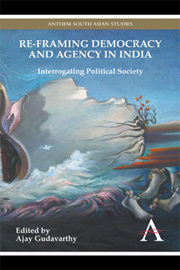Book contents
- Frontmatter
- Contents
- Preface and Acknowledgements
- List of Tables
- Chapter 1 Introduction: Why Interrogate Political Society?
- Part I Political Society and Protest Politics
- Chapter 2 Political Society in a Capitalist World
- Chapter 3 Antinomies of Political Society – Implications of Uncivil Development
- Chapter 4 Civil Society and the Urban Poor
- Chapter 5 Contentious Politics and Civil Society in Varanasi
- Chapter 6 The Politics of a Political Society
- Part II Political Society, Middlemen and Mobility
- Part III Civil Society and/or Political Society
- Part IV Rejoinder
- List of Contributors
Chapter 2 - Political Society in a Capitalist World
from Part I - Political Society and Protest Politics
Published online by Cambridge University Press: 05 June 2012
- Frontmatter
- Contents
- Preface and Acknowledgements
- List of Tables
- Chapter 1 Introduction: Why Interrogate Political Society?
- Part I Political Society and Protest Politics
- Chapter 2 Political Society in a Capitalist World
- Chapter 3 Antinomies of Political Society – Implications of Uncivil Development
- Chapter 4 Civil Society and the Urban Poor
- Chapter 5 Contentious Politics and Civil Society in Varanasi
- Chapter 6 The Politics of a Political Society
- Part II Political Society, Middlemen and Mobility
- Part III Civil Society and/or Political Society
- Part IV Rejoinder
- List of Contributors
Summary
Partha Chatterjee is one of the very few scholars in India who have systematically tried to theorize the specificity of Indian democratic politics. His conceptualization of political society can be seen as an approach to explicate the latter's logics. This conceptualization has been modified and refined over the years by mediating on the concrete historical experience of a post-colonial country and through a critical engagement with the received Western normative political theory. In this paper, I will first provide a sketch of Chatterjee's criticism of the concept of civil society, and then present a critical review of his concept of political society. I will focus on the three tension-ridden components of his project, viz. the defence of a communal way of life, mapping the differentiated political space, and a suspicion towards constitutionalism. I will argue, against Chatterjee, that the concept of political society does not denote a positive political development, that is, it does not present a possibility for ‘substantially redefining property and law’ in favour of subaltern people/classes or the ‘actual expansion of the freedoms of the people’; rather, it should be used to provide a critical insight into Indian politics, particularly in relation to the process of capitalist expansion and differentiation.
Chatterjee's Critique of Civil Society
It is well known that the discussion on political society is embedded in the debate on civil society and the critique of the conceptual infrastructure of Western normative theory.
- Type
- Chapter
- Information
- Re-framing Democracy and Agency in IndiaInterrogating Political Society, pp. 31 - 48Publisher: Anthem PressPrint publication year: 2012
- 1
- Cited by



